De Nederlandse dichter en schrijver Remco Campert werd op 28 juli 1929 in Den Haag geboren. Zie ook alle tags voor Remco Campert op dit blog.
zilver praten
zilver praten in parken
de gele knapenzon
toont zijn gespannen lijf aan
de meisjes op de kiezelpaden
zij draaien hun zinnen
als parasollen om en om
Jongeling
Auto’s kunnen rijden in een waas van weemoed
naar de duinen naar het feest
met het meisje dat mee moet
naar de villa waar je al eerder bent geweest
naar het feest dat woedt
van de zon die ondergaat
tot de zon die opkomt als je naar bed gaat
met het meisje dat mee moet
en dat drankzuchtig en desolaat op de piano staat
huilend van liefde die vergaat
– een vrijer in Zwitserland en één in een Balkanstaat –
en dat het toch niet baat en dat ze dáárom
maar met jou naar bed gaat.
Auto’s kunnen rijden in een waas van weemoed
vroeg in de morgen vooral
terug naar de stad, naar de asfaltzorgen
langs fietsers, fabriek en schoorsteenroet
naar de stad naar de huizen
in een auto die naar leer ruikt en naar stof
met het meisje dat mee moest
en dat moegedronken en moegekust
uitrust van haar roes
in een auto die rijdt langs benzinepompen
torenspitsen en een straat in aanbouw
richtingborden en spoorwegrails
en op de radio een praatje voor de huisvrouw.
KOUD
Winter nadert.
Ik voel het aan de lucht
En aan de woorden die ik schrijf.
Alles wordt klaarder: de straat
Is tot aan zijn eind te zien. De woorden
Hebben geen eind.
Ik ben dichter
Bij de waarheid in december
Dan in juli. Ik ben dichter
Bij de gratie van de kalender, lijkt het
Soms wel. Toch, de woorden niet, de steden
Nemen hun eind.
Als er ergens
Zomer en winter, maar een ster
Brandde die een fel wit licht gaf.
Ik zeg een ster, maar het
Mag alles zijn. Als het maar brandt en
Woorden warmte geeft.
Maar ik geloof
Niet, ’s winters nog minder, aan
Zo’n ster. In woorden moet ik geloven.
Maar wie kan dat? Ik ben
Een stem, stervend en koud, vol
Winterse woorden.
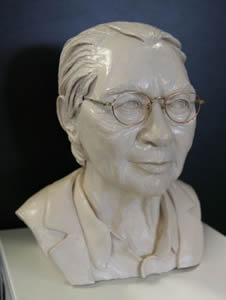
Remco Campert (Den Haag, 28 juli 1929)
Borstbeeld door Patrick Mezas
De Engelse dichter, verhalen- en romanschrijver Malcolm Lowry werd geboren 28 juli 1909 in Birkenhead Merseyside. Zie ook alle tags voor Malcolm Lowry op dit blog.
Uit:Under the Volcano
“Come, amigo, throw away your mind,” Dr. Vigil said behind him.
“–But hombre, Yvonne came back! That’s what I shall never understand. She came back to the man!” M. Laruelle returned to the table where he poured himself and drank a glass of Tehuacan mineral water. He said:
“Salud y pesetas.”
“Y tiempo para gastarlas,” his friend returned thoughtfully.
M. Laruelle watched the doctor leaning back in the steamer chair, yawning, the handsome, impossibly handsome, dark imperturbable Mexican face, the kind deep brown eyes, innocent too, like the eyes of those wistful beautiful Oaxaquenan children one saw in Tehuantepec (that ideal spot where the women did the work while the men bathed in the river all day), the slender small hands and delicate wrists, upon the back of which it was almost a shock to see the sprinkling of coarse black hair.
“I threw away my mind long ago, Arturo,” he said in English, withdrawing his cigarette from his mouth with refined nervous fingers on which he was aware he wore too many rings. “What I find more–” M. Laruelle noted the cigarette was out and gave himself another anís.
“Con permiso! Dr. Vigil conjured a flaring lighter out of his pocket so swiftly it seemed it must have been already ignited there, that he had drawn a flame out of himself, the gesture and the igniting one movement; he held the light for M. Laruelle. “Did you never go to the church for the bereaved here,” he asked suddenly, “where is the Virgin for those who have nobody with?”
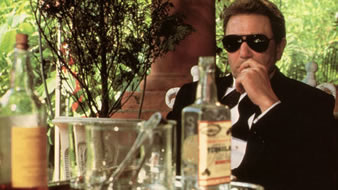
Malcolm Lowry (28 juli 1909 – 26 juni 1957)
Scene uit de film van John Huston (1984) met Albert Finney als Geoffrey Firmin
De Argentijnse schrijfster Angélica Gorodischer werd geboren in Buenos Aires op 28 juli 1928. Zie ook alle tags voor Angélica Gorodischer op dit blog.
Uit: The End of a Dynasty or The Natural History of Ferrets (Vertaald door Ursula K. Le Guin)
“And they were full, for these were the years of the Hehvrontes dynasty, those proud, rigid rulers, tall and handsome, with white skin and very black eyes and hair, who walked without swinging their shoulders or hips, head high, gaze fixed somewhere beyond the horizon, not looking aside even to see their own mother in her death-agony, not looking down even if the path was rough and rocky, falling into a well if it was in the way and standing erect down inside the well, maintaining the dignity of the lords of the world. That’s what they were like, I’m telling you, I who’ve read the old histories till my poor eyes are nearly blind. That’s what they were like.
Livna’lams’s grandfather was the eighth emperor of the Hehvrontes dynasty; and his father — well, we’ll be talking about his father presently. That is, I’ll be talking, because you ignorant boors know nothing of the secret history of the Empire, occupied as you are in the despicable business of accumulating money, decorating your houses out of vanity not love of beauty, eating and drinking and wallowing your way to apoplexy and death. I’ll talk about him when the time comes. For now, suffice it to say that the pride of the Hehvrontes had elaborated a stupid, showy, formal protocol unequalled at any other period of the Empire except that of the Noörams, who were equally stupid but less showy and more sinister. Luckily for people like you, the Noörams killed each other off, and nobody believes the story that a servant saved from the bloodbath a newborn son of the Empress Tennitraä, called The She-Snake and The Unjust, though nobody can disprove the story either…. “
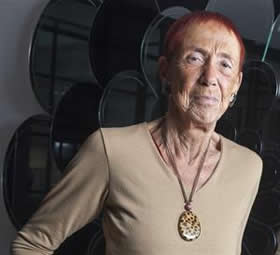
Angélica Gorodischer (Buenos Aires, 28 juli 1928)
De Engelse dichter en Jezuïet Gerard Manley Hopkins werd geboren op 28 juli 1844 in Stratford, Essex. Zie ook alle tags voor Gerard Manley Hopkins op dit blog.
Brothers
How lovely the elder brother’s
Life all laced in the other’s,
Lóve-laced!—what once I well
Witnessed; so fortune fell.
When Shrovetide, two years gone,
Our boys’ plays brought on
Part was picked for John,
Young Jóhn: then fear, then joy
Ran revel in the elder boy.
Their night was come now; all
Our company thronged the hall;
Henry, by the wall,
Beckoned me beside him:
I came where called, and eyed him
By meanwhiles; making my play
Turn most on tender byplay.
For, wrung all on love’s rack,
My lad, and lost in Jack,
Smiled, blushed, and bit his lip;
Or drove, with a diver’s dip,
Clutched hands down through clasped knees—
Truth’s tokens tricks like these,
Old telltales, with what stress
He hung on the imp’s success.
Now the other was bráss-bóld:
Hé had no work to hold
His heart up at the strain;
Nay, roguish ran the vein.
Two tedious acts were past;
Jack’s call and cue at last;
When Henry, heart-forsook,
Dropped eyes and dared not look.
Eh, how áll rúng!
Young dog, he did give tongue!
But Harry—in his hands he has flung
His tear-tricked cheeks of flame
For fond love and for shame.
Ah Nature, framed in fault,
There ’s comfort then, there ’s salt;
Nature, bad, base, and blind,
Dearly thou canst be kind;
There dearly thén, deárly,
I’ll cry thou canst be kind.
Binsey Poplars
(Felled 1879)
My aspens dear, whose airy cages quelled,
Quelled or quenched in leaves the leaping sun,
All felled, felled, are all felled;
Of a fresh and following folded rank
Not spared, not one
That swam or sank
On meadow and river and wind-wandering
weed-winding bank.
O if we but knew what we do
When we delve or hew-
Hack and rack the growing green!
Since country is so tender
To touch, her being so slender,
That, like this sleek and seeing ball
But a prick will made no eye at all,
Where we, even where we mean
To mend her we end her,
When we hew or delve:
After-comers cannot guess the beauty been.
Ten or twelve, only ten or twelve
Strokes of havoc unselve
The sweet especial scene,
Rural scene, a rural scene,
Sweet especial rural scene.
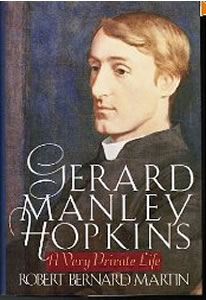
Gerard Manley Hopkins (28 juli 1844 – 8 juni 1889)
De Nederlandse schrijver, columnist, presentator en essayist Stephan Sanders werd geboren in Haarlem op 28 juli 1961. Zie ook alle tags voor Stephan Sanders op dit blog.
Uit: Iets meer dan een seizoen
‘Een jonge, Surinaamse man. Geen neger – veel beter was ik toen niet ingevoerd in de Surinaamse verhoudingen.’
(…)
‘Hij riep bijvoorbeeld meteen: “Maar jij bent ook bruin”, en dat was niet minder dan een hartenkreet, een constatering die alles verklaarde, maar die mij enkel deed blozen.’
(…)
‘Heb mezelf altijd voorgehouden nooit me vrienden te breken om politieke meningsverschillen. Maar goed, dat is ook niet de werkelijke reden waarom wij ons de laatste jaren gestaag maar resoluut van elkaar verwijderen. Hooguit gebruiken we de politiek als een alibi, als aannemelijk excuus. De verwatering van onze vriendschap, het opbreken van wat we ooit, zonder bang te zijn voor pathetiek, broederschap noemden – het gaat natuurlijk over jaloezie, verraad, concurrentie, broedertwist – het eerder de trekken van een Griekse tragedie dan een modern politiek conflict. Kunnen vrienden, net als echtparen, ook scheiden?’
(…)
‘Anil was een achterblijver, de beheerder van een failliete boedel, die ziet dat zijn levenswerk toen hij even niet oplette een andere richting heeft genomen dan hem oorspronkelijk voor ogen stond. De man die zichzelf en zijn idealen “overleefd” heeft en dus “overbodig” dreigt te worden.’
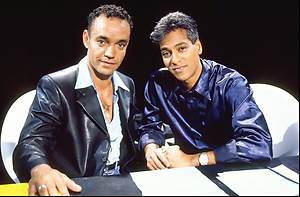
Stephan Sanders (Haarlem, 28 juli 1961)
Stephan Sanders en Anil Ramdas ten tijde van “Het blauwe licht:”
Zie voor nog meer schrijvers van de 28e juli ook mijn blog van 28 juli 2011 deel 2.
